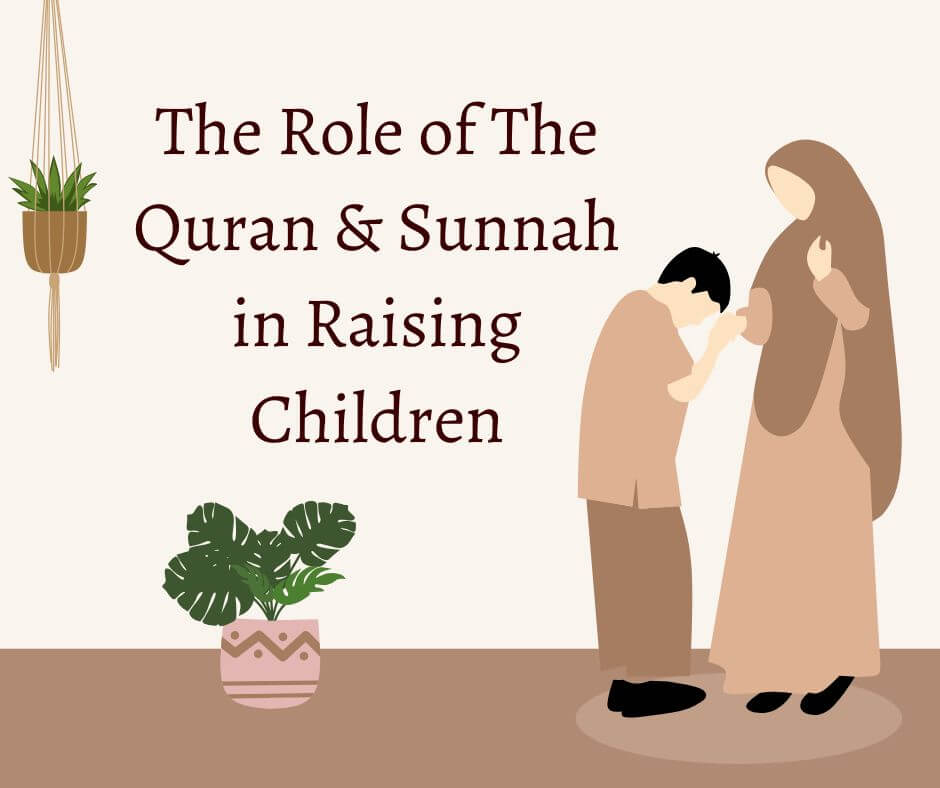It is the deepest desire of every conscious mother to inculcate Islamic values in her children. This desire remains just a desire if we do not realize that the solutions to all parenting problems are in the Quran and Sunnah. Only a parent connected to the Quran and with the Marefat of Allah SWT can help children develop Islamic values. Again, nobody can Guarantee this connection, and if this were the criteria I would be the last ineligible parent to write an article on parenting. Therefore, we all can try our best to keep ourselves connected to Allah SWT and study this subject with His help inshaAllah.
Qualities to Inculcate in Light of the Quran and Hadith
So, to begin with, the clarity of what we want in them is very important. This is a very vast topic but we will focus on some basic and doable aspects. As a beginner, we can just list out in brief some of the qualities that we want to inculcate in our children in the light of the Quran and Sunnah.
1. Love and Marefat of Allah SWT
Knowing who Allah is, is the foundation of Deen. Allah SWT describes himself best in the Quran through His names and attributes.
In Surah Hashr Ayah 22 to 24 we can experience the beauty of His description. Teaching them 99 names will help us build a strong spiritual foundation. Pondering on his creation and His Sifaat helps us in knowing who Allah SWT is.
Teaching them about the mutashabihaat is equally important. In Ahadith and the Quran, we are encouraged to ponder over the signs in the universe. On the other hand, we are discouraged and stopped from thinking about the zaat of Allah SWT. For example, we can share this verse of Al Baqara (verse no 186) where Allah SWT says that;
He is closer to us than the Jugular Vein
We can ask children how is it possible. Then tell them He is closer to us through His Knowledge and not in physical form. And we can directly ask Allah SWT without any barriers. He is Samee and Aleem; one who listens and has deep knowledge of everything. He is Al Wadood who loves us unconditionally and His love is more than the love of 70 mothers. And the list is endless.
Related: Child Upbringing in Light of the Quran
2. Leading by Example
Children follow what they see and not what we say. So focus on your actions, not your words.
Therefore as parents, we must haste in doing good deeds, especially in learning religion putting aside our tiredness and laziness. A simple act like mindful buying and avoiding unnecessary shopping could be a great example for children to learn simplicity in their lives insha Allah.
Children observe us day and night so everything we do is being duplicated by them. It could turn the opposite as well. If we choose laziness, procrastination, being late to prayer, and not attending Islamic gatherings then our children will absorb these behaviors and will reciprocate the bad conduct. We parents should always walk our talk. We must never say things that we ourselves don’t implement.
For example, if we want to limit YouTube time with our children then we can’t be hooked up to our Instagram and YouTube accounts. This is one of the most common complaints that parents make that they are unable to cut their screen time while they are addicted to screens. I am sharing below a hadith that every parent should ponder upon inshaAllah:
A man will be brought on the Day of Resurrection and thrown in the (Hell) Fire, so that his intestines will come out, and he will go around like a donkey goes around a millstone. The people of (Hell) Fire will gather around him and say: O so-and-so! What is wrong with you? Didn’t you use to order us to do good deeds and forbid us to do bad deeds? He will reply: Yes, I used to order you to do good deeds, but I did not do them myself, and I used to forbid you to do bad deeds, yet I used to do them myself. – Sahih al-Bukhari 3267
3. Gratitude and Humility
This is another key quality that we would want to develop in our children. In this age of research, we all know how beneficial is to have this quality in ourselves. Children with gratitude feel happier, tend to have better social relationships, and have higher chances of living healthier and longer life.
We can explain to our children that our Quran starts with Alhamdulillahi Rabbil Aalameen. Giving thanks to Allah is afzal ibadat. We must teach them that this is a complete kalima and we should lead a life that reflects upon this kalima. We say alhamdulillah whenever we want to show gratitude to Allah. This could be when something we like happens as well as something that we don’t like. I am quoting a beautiful hadith that helps us understand how to apply this in our lives.
Aisha reported:
If the Messenger of Allah, peace and blessings be upon him, saw something he liked, he would say, “All praise is due to Allah, by whose favor good deeds are accomplished.” If the Prophet saw something he disliked, he would say, “All praise is due to Allah in every circumstance. – Sunan Ibn Mājah 3803 (Da’if)
It can be challenging to teach humility as modern education focuses on developing personality ethics instead of character ethics. We are taught to be bold, confident, and competitive to be successful. But this isn’t true. We must share the example of the prophet Mohammed (SAWS) and his idea of success with our children. His unmatched humility was the key to his huge success.
After a big struggle period of 20 years when He got the victory of Makkah and the way He entered that city was fascinating and interesting. Tens of thousands of Muslims marched into Makkah with no attaching, no fighting, no bloodshed, no war and achieved victory and established Islam in Makkah.
When Mohammed (SAWS) entered Makkan he was riding a camel. His back was so hunched that he almost touched the back of his animal. He didn’t ride in pride holding up his head high which he could do easily at this great moment of joy and victory. It is a unique example in itself. Historians call it the bloodless revolution. This is what was achieved with humility and strength of character.
4. Order and Organization:
Order and organization is a fard in Islam. This is a great virtue that guarantees success in this world and the hereafter inshaAllah. In Deen establishing salah is success. And no one can establish salah if they don’t have discipline order. So to develop this quality I am sharing below a few practical tips for our children to follow.
A) Establish a daily routine: The best is to plan our day around namaz. We should make sure that we ourselves pray on time and help our children do it inshaAllah. Planning things between namaz will give you a spiritual boost and barakah inshaAllah.
B) Task Division: Diving tasks among siblings is a great way to build teamwork. It will help them develop accountability. We can share a lot of stories from Seerah about how Nabi (SAWS) planned and divided tasks during battles and other important situations.
C) Reward System: We must praise and reward children for keeping our homes clean.
Related: Learn about the responsibilities of parents toward their children in Islam
5. Teach Them Cleanliness and Taharah
According to a Hadith Cleanliness is half of Faith. This should be well absorbed in the minds of our children. And we should know that in deen cleanliness is both internal and external. It is the act of cleaning ourselves both from physical and spiritual impurities. In modern education, focus is only on the external.
Introduce them to types of Taharah: Wudu, Tayammum, and Ghusl, and how to perform them to achieve purity for Ibadaat.
We should also teach them about behaviors and acts that lead us to the sins of the heart. Besides our anatomical heart, Allah SWT has given us a spiritual heart which we need to take care of every single moment. This concept of spirituality should be taught right in childhood to shape their minds according to Islam inshaAllah.
6. Love and Compassion Towards Others:
Love is a universal emotion. It includes the Love of Allah, self, other human beings, and all creation of Allah. Loving ourselves and others for the sake of Allah helps us get detached from worldly life. This is another very important concept that should be taught right in childhood insha’Allah.
Related: Teaching Children About Brotherhood in Islam
This is a century where depression and different mental illnesses have become a pandemic. A reason for this could be that our children are not taught about the emotions and rights of Allah SWT and fellow human beings in school education.
We should take children on Charity trips and teach them to be grateful for our blessings. The joy of giving and sharing can be learned only through rich experiences. These experiences will make a mark in tiny hearts to absorb these holistic concepts. Helping others is a way to get help from Allah SWT.
I pray to Allah SWT that He gives us taufeeq to implement whatever we learn in this article and become parents who lead by example inshaAllah.



